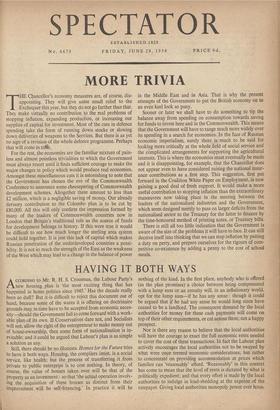MORE TRIVIA
THE Chancellor's economy measures are, of course, dis- appointing. They will give some small relief to the Exchequer this year, but they do not go further than that. They make virtually no contribution to the real problems of stopping inflation, expanding production, or increasing our supplies of capital for investment. Most of the cuts in defence spending take the form of running down stocks or slowing down deliveries of weapons to the Services. But there is as yet no sign of a revision of the whole defence programme. Perhaps that will come in titice.
For the rest, the economies are the familiar mixture of pain- less and almost pointless trivialities to which the Government must always resort until it finds sufficient courage to make the major changes in policy which would produce real economies. Amongst these miscellaneous cuts it is astonishing to note that the Government has chosen the eve of the Commonwealth Conference to announce some cheeseparing of Commonwealth development schemes. Altogether these amount to less than £2 million, which is a negligible saving of money. Our already derisory contribution to the Colombo plan is to be cut by £80,000. All this will only confirm the impression formed by many of the leaders of Commonwealth countries now in London that Britain's traditional role as the source of funds for development belongs to history. If this were true it would be difficult to see how much longer the sterling area system could hold together. It is just this lack of capital which makes Russian penetration of the underdeveloped countries a possi- bility. It is not so much the strength of the East as the weakness of the West which may lead to'a change in the balance of power in the Middle East and in Asia. That is why the present attempts of the Government to put the British economy on to an even keel look so puny.
Sooner or later we shall have to do something to tip the balance away from spending on consumption towards saving for funds to invest here and in the Commonwealth. This means that the Government will have to range much more widely over its spending in a search for economies. In the face of Russian economic imperialism, surely there is much to be said for looking more critically at the whole field of social service and the complicated arrangements for supporting the agricultural interests. This is where the economies must eventually be made and it is disappointing, for example, that the Chancellor does not appear even to have considered raising the national insur- ance contributions as a first step. This suggestion, first put forward in the Coalition White Paper on Employment, is now gaining a good deal of fresh support. It would make a more useful contribution to stopping inflation than the extraordinary manoeuvres now taking place in the meeting between the leaders of the nationalised industries and the Government, which seem designed merely to pass on larger deficits from the nationalised sector to the Treasury for the latter to finance by the time-honoured method of printing notes, or Treasury bills.
There is still all too little indication that the Government is aware of the size of the problems it will have to face. It can still deceive itself into thinking that we can stop inflation by putting a duty on perry, and prepare ourselves for the rigours of com- petitive co-existence by adding a penny to the cost of school meals.


































 Previous page
Previous page